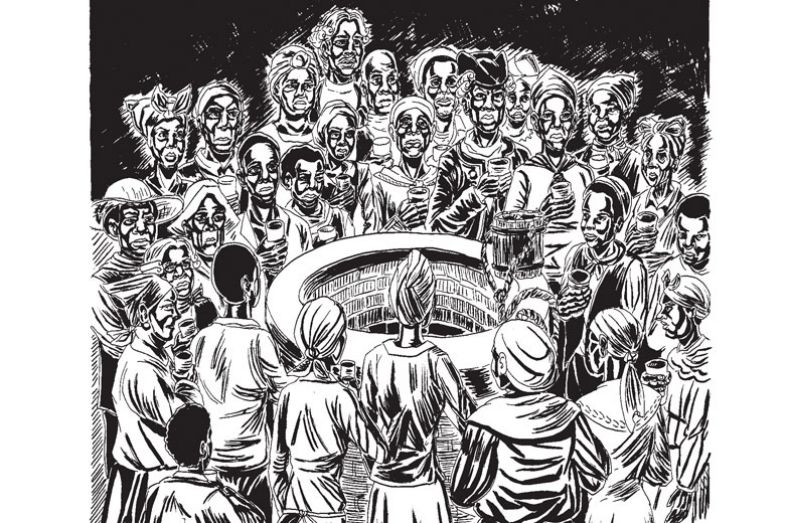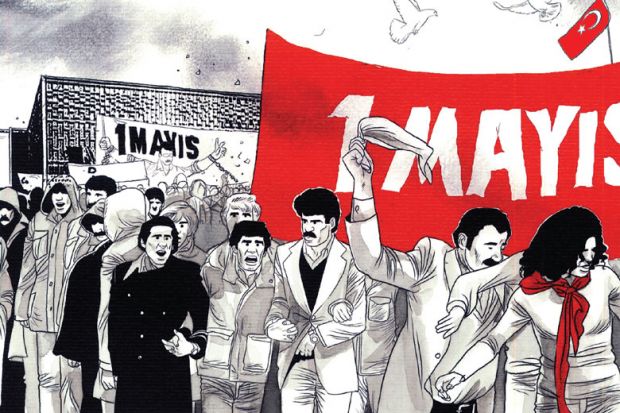Seven years ago, Jenny White carried out a series of interviews about the ferocious political factionalism that tore apart Turkish society – and universities – in the 1970s.
A professor at Stockholm University’s Institute for Turkish Studies, she initially planned to use the material for “a standard scholarly monograph”. What she soon realised, however, was that her informants saw the events as “the arena for their coming-of-age experiences and turning points in their lives”. Since academic analysis “flattened these stories into discussions of abstract issues”, she decided to try to “retain the nuances and contradictions of history as it is lived” by producing a graphic narrative. Turkish Kaleidoscope: Fractured Lives in a Time of Violence, illustrated by Ergün Gündüz, has just been published by Princeton University Press.
Though the book opens with a brief historical essay, it also makes use of composite characters. Yet Professor White was emphatic that the book was just as rigorous as conventional scholarly writing: “The images, clothing, actions, setting, as well as every word, were painstakingly chosen [and] checked for accuracy…My book is fiction, but it’s also true.”

Source: © Rebecca Hall/Hugo Martinez and Simon & Schuster
At a time when academics are very concerned with how gender, race and class intersect, Professor White noted that her graphic novel “built all of these forces into the story through action and dialogue, so…the reader literally can see the multitude of forces, some quite subtle or contradictory, that produce factionalism”.
Turkish Kaleidoscope is part of a growing wave of graphic novels or narratives in which academics seek to make their research widely available. This month saw the publication of Eleanor Janega’s The Middle Ages: A Graphic History (Icon Books), illustrated by Neil Max Emmanuel. The book, said the author, who has taught at KIng’s College London and the London School of Economics, drew on her specialist research on Czech history and “conceptions of sexuality and apocalypticism” but aimed to “bring people into the conversation and allow them to feel like they can also have a firm grasp on what can be a very complex area of history”. The graphic format had allowed her to “signal to audiences that medieval history is, in fact, fun” and not just “a series of dry religious pronouncements and dour wars”. To follow in September is David Hajdu and John Carey’s A Revolution in Three Acts: The Radical Vaudeville of Bert Williams, Eva Tanguay and Julian Eltinge (Columbia University Press).
Yet many scholars worry whether such books will be an asset or a liability on their CVs.
Last year, Lisa Mckenzie, an assistant professor in Durham University’s department of sociology, “realised that working-class voices would probably disappear from the Covid crisis pretty quickly” and asked a number of people to keep 28-day diaries. Keen to make the material available in an accessible format, she found six graphic artists and sought funding for a graphic novel through the Kickstarter website.
The project was “rigorous in methodology and rationale”, so “there [was] no reason why it should not be recognised and respected like any other piece of social research”, yet she also feared that “it won’t be respected”.
Similar concerns were expressed by Rebecca Hall, whose Wake: The Hidden History of Women-Led Slave Revolts (Particular Books), illustrated by Hugo Martinez, was published this month.
After completing her doctorate, Dr Hall “had a series of postdocs and visiting professorships” as well as a tenure-track offer that was “withdrawn because of a hiring freeze”, but never managed to establish an academic career. Though she had published a prize-winning article about it, she “always wanted to make my dissertation project accessible to the mainstream”.
Her new graphic narrative has enabled her to do just that, she told Times Higher Education, bringing together the results of in-depth research in neglected archives and her own “background as a granddaughter of slaves” to explore “how the history of slavery haunts and shapes our present”. The book took her two years and, she stressed, “does not ‘dumb down’ the material” but “presents it in its own rich, complex way”. Yet she also suspected it “would not ‘count’ as anything in academia” if she were still looking for a job.
Others disputed whether the academy was still prejudiced or snobbish about research presented in “unconventional” formats.
Liz Stanley, professor of sociology at the University of Edinburgh, is also deputy chair of the sociology panel for the 2021 research excellence framework. In considering submissions, she said, formats were unimportant and “what governs the assessment of something are the criteria of originality, rigour and significance”. In her own practice, she went on, she had always been “interested in exploring the borderlands that lie between fact and fiction, past and present, and other supposed binaries” and was happy to engage with any sort of material.
As for Professor White, she now had “an established reputation based on three monographs” and so didn’t have to “worry about what my colleagues think [about her publishing graphic novels] – though to be honest most of them think it’s very cool”.
Register to continue
Why register?
- Registration is free and only takes a moment
- Once registered, you can read 3 articles a month
- Sign up for our newsletter
Subscribe
Or subscribe for unlimited access to:
- Unlimited access to news, views, insights & reviews
- Digital editions
- Digital access to THE’s university and college rankings analysis
Already registered or a current subscriber? Login









